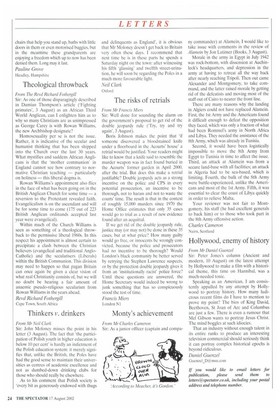The risks of retrials
From Mr Francis Miers Sir: Well done for sounding the alarm on the government's proposal to get rid of the double jeopardy rule (`Try, try and try again', 3 August).
Boris Johnson makes the point that `if someone discovered a bloodstained knife under a floorboard in the Acourts' house' a retrial would be justified. Your readers might like to know that a knife said to resemble the murder weapon was in fact found buried in the Acourts' former garden in April 2000, after the trial. But does this make a retrial justifiable? Double jeopardy acts as a strong incentive on the police and CPS in every potential prosecution, an incentive to be thorough, not to harass and not to waste the courts' time. The result is that in the context of roughly 15,000 murders since 1970 the Home Office estimates that only 35 cases would go to trial as a result of new evidence found after an acquittal.
If we get rid of the double jeopardy rule, justice may (or may not) be done in these 35 cases, but at what price? How many guilty would go free, or innocents be wrongly convicted, because the police and prosecutors had no incentive to be thorough? Would London's black community be better served by retrying the Stephen Lawrence suspects, or by the protection double jeopardy gives it from an 'institutionally racist' police force? Until these questions are answered, the Home Secretary would indeed be wrong to junk something that has so conspicuously stood the test of time.
Francis Miers London N-1






























































 Previous page
Previous page